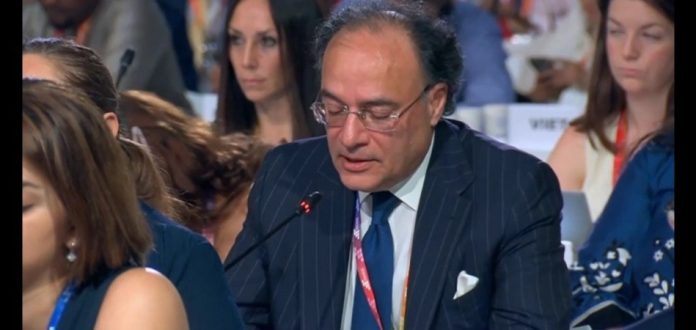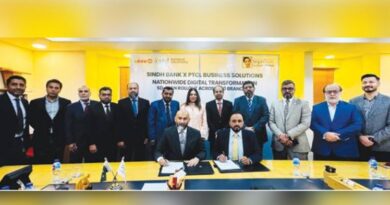Aurangzeb advocates country-led, results-based development Spain conference
APP
ISLAMABAD: Federal Minister for Finance and Revenue, Senator Muhammad Aurangzeb, has called for a renewed global commitment to revitalising international development cooperation to meet the aspirations of the 2030 Agenda for Sustainable Development.
Speaking at a multi-stakeholder round table during the Fourth International Conference on Financing for Development (FFD4) in Sevilla, Spain, the minister emphasised that such revitalisation is not merely desirable but essential at this pivotal juncture for global development.
The minister laid out a comprehensive three-pronged strategy to effectively implement the Sevilla Outcome and foster meaningful progress. As a first step, he stressed the need for urgent execution of priority actions to transition from pledges to tangible delivery.
This, he noted, must involve greater country ownership of development agendas, with national strategies taking precedence over donor-driven models. Aligning frameworks with domestic priorities is key to ensuring sustainability and relevance on the ground.
The Minister further underscored the importance of expanding access to concessional and blended financing—particularly for climate initiatives and Sustainable Development Goals (SDG)-related investments—in order to catalyse private capital in fiscally constrained developing countries.
He called for a thorough reform of the global financial architecture, urging multilateral development banks, international financial institutions, and credit rating agencies to better reflect countries’ reform efforts, climate vulnerabilities, and developmental ambitions in their lending terms and assessments.
Senator Aurangzeb also highlighted the need for a paradigm shift in how development cooperation is approached within developing countries themselves. He advocated moving away from input-focused models towards strategies that are results-oriented and linked to measurable development outcomes.
He urged the integration of cross-cutting themes such as climate resilience, gender equity, and digital inclusion into development plans, while emphasising the need to scale up South-South and triangular cooperation through context-specific, peer-driven solutions rather than externally imposed frameworks.
As a third key measure, the minister proposed the establishment of global delivery mechanisms to accelerate implementation of the Sevilla Commitments. These could include expanded blended finance platforms designed to de-risk private investment through instruments such as guarantees, first-loss capital, and outcome-linked bonds.
He called for the formation of new multi-stakeholder partnerships that would bring together governments, development banks, philanthropic entities, and private investors around shared, measurable goals. Additionally, the Minister recommended setting up a dedicated global facility or task force tasked with monitoring and fast-tracking the Sevilla action agenda, complete with timelines, assigned responsibilities, and robust accountability systems.
Aurangzeb reaffirmed Pakistan’s commitment to fostering inclusive and results-driven partnerships. He urged the international community to move decisively from rhetoric to action, stating, “Let us resolve today to drive this transformation together,” he remarked.
Federal Minister for Finance and Revenue, Senator Muhammad Aurangzeb on Wednesday represented Pakistan in a high-level panel discussion titled “Scaling up SME Finance” hosted at the International Business Forum, held on the sidelines of the Fourth International Conference on Financing for Development (FfD4) in Sevilla, Spain.
The discussion brought together global policymakers and financial leaders to exchange ideas on strengthening financing mechanisms for small and medium enterprises (SMEs), which are widely recognised as critical engines of inclusive economic growth.
Addressing the session, Finance Minister Aurangzeb underscored the importance of SMEs to Pakistan’s economy, noting that these enterprises account for approximately 40 percent of the country’s GDP, 25 percent of exports, and nearly 78 percent of non-agricultural employment. Despite their significant contribution, he observed that SME access to formal finance remains disproportionately low, with a small percentage of private-sector lending currently directed towards them.
The Finance Minister highlighted that the government of Pakistan has adopted a whole-of-government approach to address these challenges and unlock the full potential of the SME sector. As part of its strategic vision, the government aims to raise SME financing to 17 percent of total private-sector credit by 2028. This target is designed to bring Pakistan more in line with comparable South Asian economies such as Bangladesh and India, and with global emerging market benchmarks.
He said the government of Pakistan was actively working through the central bank to encourage commercial banks to expand their SME lending portfolios. This expansion is expected to enhance the contribution of SMEs to GDP, exports, employment, youth and women’s digital empowerment, and overall financial inclusion, laying the foundation for sustained and inclusive economic growth. To support this agenda, a multi-billion credit guarantee facility has been rolled out under the Prime Minister’s Youth, Business and Agriculture Loan Scheme. The government has also committed to bearing up to 50 percent of potential credit losses on principal for small businesses.
The Finance Minister also highlighted the government’s intention to revise and expand the National SME Policy 2021 to set a comprehensive five-year roadmap for sectoral development. Parallel efforts are underway to strengthen the institutional capacity of the Small and Medium Enterprises Development Authority (SMEDA) so it can extend market linkages, provide regulatory relief, enhance advisory services, and lead capacity-building initiatives. Deregulation efforts, such as reducing reliance on NOCs and increasing e-inspections, are also being introduced to reduce compliance burdens for SMEs.
He expressed Pakistan’s interest in learning from successful models across other emerging markets and fostering partnerships that promote technology-driven, climate-compliant, and socially inclusive SME development. He reaffirmed the government’s strong resolve to support small businesses and develop a more enabling financial ecosystem that can drive sustainable and equitable growth.
Prime Minister Muhammad Shehbaz Sharif on Wednesday applauded the Ministry of Finance and the Federal Board of Revenue (FBR) for achieving a historic 42% increase in federal tax revenues during the fiscal year 2024-25 — the highest surge in the past decade.
The prime minister chaired a high-level weekly review meeting on the digitization and reform agenda of the Federal Board of Revenue (FBR), whereas during the briefing, it was revealed that reforms and enforcement of new tax laws enabled the government to collect an additional Rs 865 billion in revenues compared to the previous year, an eightfold increase. The federal revenue-to-GDP ratio also improved significantly, reaching 11.3 per cent, a 1.5 per cent rise over last year.
Prime Minister Shehbaz Sharif emphasized that no institutional complacency will be tolerated in achieving revenue targets and other economic goals for the new fiscal year. “All departments must work with complete dedication,” he said, reaffirming his personal oversight of all stages of revenue collection and economic target implementation.
He instructed FBR to treat taxpayers with dignity and respect and called upon all public sector institutions to extend full cooperation with the revenue authority. The prime minister also stressed the need to broaden the tax net through digitalization and enforcement.
PM Sharif also issued key directives including expansion of the Track and Trace Digital Production System to cover all stages of production and distribution in order to bring untaxed production into the tax net, mandatory digitization of production processes for tax non-compliant businesses and industries, widening the Point of Sale (POS) system in the retail sector to strengthen documentation and transparency and ensuring business facilitation by keeping FBR accessible to the business community and taxpayers.
The Prime Minister congratulated the meeting participants on the successful passage of the upcoming fiscal year’s budget and reiterated the government’s unwavering commitment to ensuring Pakistan’s bright economic future.
It was informed during the briefing that the Track and Trace system has already been fully implemented in sugar, tobacco, and fertilizer sectors, and will soon be expanded to cement and other industries.
The meeting was attended by Federal Minister for Information and Broadcasting Attaullah Tarar, Federal Minister for Law Azam Nazeer Tarar, FBR Chairman, and other senior government officials.



